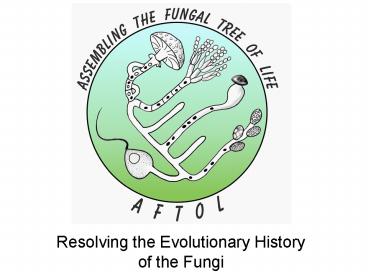Resolving the Evolutionary History of the Fungi - PowerPoint PPT Presentation
1 / 19
Title: Resolving the Evolutionary History of the Fungi
1
- Resolving the Evolutionary History of the Fungi
2
Deep Hypha
- AFTOL
- Initiated by Deep Hypha Research Coordination
Network - AFTOL funded in 2002
- Five laboratories at four institutions
- 2100 species, 5200 sequences (6 genes)
- Subcellular characters (e.g., nuclear division,
septal pore) - Training 8 postdocs, 12 grad students, 17
undergraduates, 26 visiting scientists, gt100
collaborators from gt20 countries - 63 publications, gt60 presentations, 7 workshops
- Complete revision of Kingdom Fungi TOL webpages
- Unified phylogenetic supraordinal classification
of Fungi
3
- Introduction historical overview of fungal
systematics - Dating the origin of Fungi
- Evolution of morphology
- 21 articles on multigene phylogenetics of most
major groups - AFTOL data
4
AFTOL Classification
- 6 phyla
- 10 subphyla
- 35 classes
- 12 subclasses
- 129 orders
David Hibbett Clark University
Mycological Research (2007) 111 509-547
5
James et al (2006) Nature 443 818-822. 6
genes 200 species
Tim James Univ. of Toronto
6
Mycological Res. (2007) 111 509-547
Nature (2006) 443 818-822.
7
AFTOL2 - hypothesis driven
- Intracellular parasites are an ancestral
nutritional mode of Fungi - The flagellum has been lost multiple time during
the evolution of the Fungi - Glomeromycota is the sister group to the Dikarya
8
Joey Spatafora Barbara Robbertse Conrad Schoch
Meredith Blackwell Cathie Aime
Francois Lutzoni Jola Miadlikowska Rytas Vilgalys
David McLaughlin
Mary Berbee
Pete Letcher
David Hibbett Brandon Matheny
Robby Roberson
9
AFTOL2 - major goals
- sample 200 target species
- phylogenomic sampling
- cDNA libraries
- massive parallel sequencing strategies
- primer development for 74 pan-orthologs
- analytical strategies
- subcellular data
- enhanced integration with molecular data
- development of ontologies
- phyloinformatic tool development
- mor
- WASABI
- Hal
10
Phylogenomic data
- Fungal genomes annotated/in progress
- Chytridiomycota (6)
- Zygomycota (3)
- Glomeromycota (1)
- Basidiomycota (28)
- Ascomycota (gt75)
- 74 pan-orthologs
- 25 from previous studies of Rokas, Koonin, and
other ATOL projects - 3 from AFTOL1
- 48 from Hal
Barbara Robbertse
John Reeves
11
HAL automated phylogenomic analysis
MCL analysis across several Inflation parameters
All vs all BLASTP search
Protein sequences In fasta format
Identify nonredundant clusters with 1 protein
from each taxon
PHYML, PAUP PHYLIP
Extract subject sequences from BLASTP output
Individual gene alignments
Super alignment
12
AFTOL1 protein coding genes RPB1, RPB2, TEF
GO slim Biological Process of 74 AFTOL genes
Vitamin metabolism
Vesicle-mediated transport
Blank
Transport
Amino acid metabolism
Transcription
RPB1 RPB2
Unknown
Sporulation
Carbohydrate metabolism
Cell cycle
Signal transduction
Cytokinesis
RNA metabolism
Cytoskeleton organization biogenesis
Ribosome biogenesis assembly
Response to stress
DNA metabolism
Generation of precursor metabolites energy
Protein modification
Lipid metabolism
TEF
Protein catabolism
Meiosis
Protein biosynthesis
Membrane organization biogenesis
48 (65) of 74 AFTOL2 genes present in B.
dendrobatidis in 5119 nonredundant ESTs
Organelle organization biogenesis
13
39 genomes 74 genes 11991 aa/species ML
(PHYML) WAGIG
Sordariomycetes
Leotiomycetes
Pezizomycotina
Eurotiomycetes
Dothideomycetes
Ascomycota
Saccharomycotina
Basidiomycota
Zygomycota
Chytridiomycota
14
Phylogenetic informativeness (per site) HAL
(black), other phylogenomic studies (green) and
used in AFTOL1 (red)
RPB1
TEF1
Collaborators Townsend, Lopez-Giraldez
15
Subcellular data
- TEM SEM
- Septal pore
- Hyphal growth organelles
- Flagellar apparatus
- Nuclear division
- Character ontologies
- D. McLaughlin
- R. Robberson
- P. Letcher
- M. Blackwell
Septal pore
Hyphal tip organelle
Zoospore ultrastructure
Nuclear division
16
Phyloinformatic tools
- mor - automated phylogenies
- D. Hibbett (Sys. Bio. 54 660-668)
- WASABI - Web Accessible Sequence Analysis for
Biological Inference - F. Lutzoni, F. Kauff (Sys. Bio. 56523-531)
- Hal - automated phylogenetic analysis of genomic
data - B. Robbertse, J. Reeves, J. Spatafora
- AFTOL structural and biochemical database
- D. McLaughlin AFTOL website aftol.org
17
Project Management
- Project coordination
- annual NESCent meetings
- annual Mycological Society of America meetings
- Training
- 8 postdocs
- 6 PhD students
- REU undergraduates
- Outreach
- Teaching the Fungal Tree of Life
- (www.clarku.edu/faculty/dhibbett/TFTOL/)
- TOL Web Project
- Workshops
18
- Resolving the Evolutionary History of the Fungi
19
Ascomycota
Basidiomycota
?
Glomeromycota
Mucoromycotina / Zygomycota
?
gt80 of all known Fungi
Olpidium
Kickxellomycotina / Zygomycota
Entomophthoromycotina / Zygomycota
Zoopagomycotina / Zygomycota
Blastocladiales / Blastocladiomycota
Kingdom Fungi
Chytridiales
Chytridiomycota
Spizellomycetales
Monoblepharidales
Neocallimastigales / Neocallimastigomycota
Microsporidia
X
Rozella
Mesomycetozoa
X loss of flagellum































